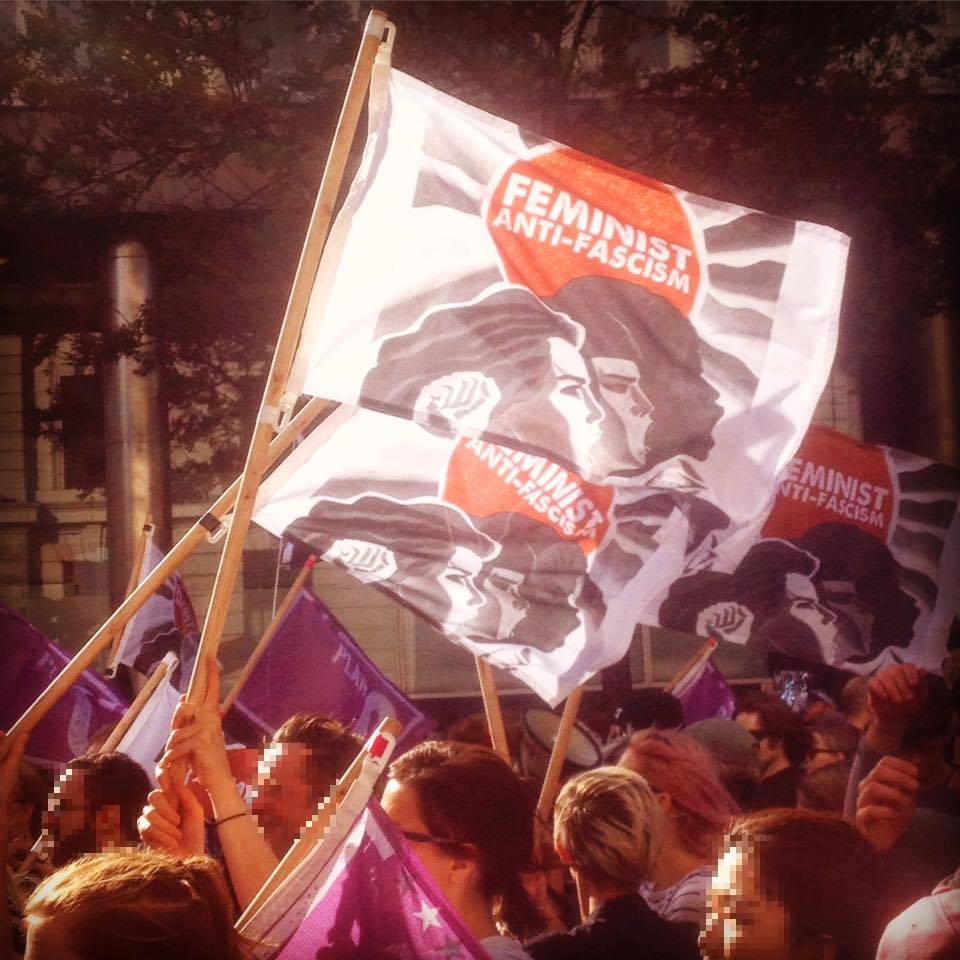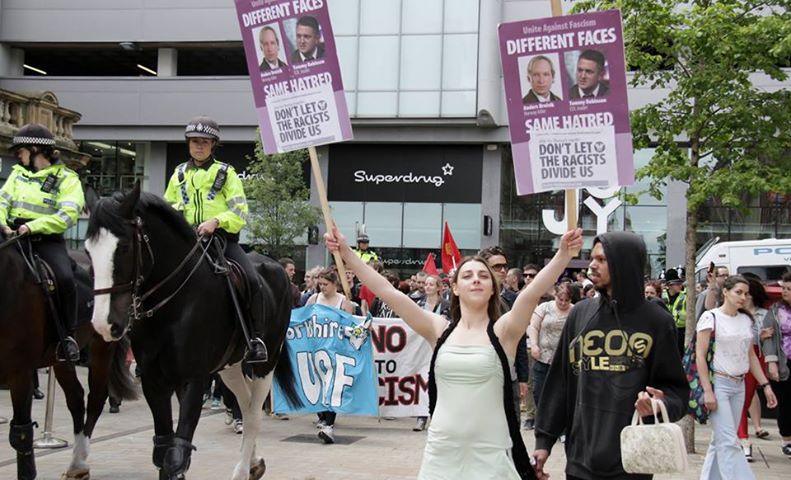On 13th October 2018, more than 2000 antifascists, led by the Women’s Strike and Feminist Anti-fa, took to the streets of central London and stopped the vastly outnumbered Democratic Football Lads Alliance (DFLA) in their path, preventing them from reaching their final meeting point at Downing Street. Further support was offered by the Stand Up to Racism static demonstration, whose numbers bolstered the feminist-led demo when it reached Trafalgar Square. This was a significant turn in the numbers of late, with the DFLA only managing to get around 1500, or a third of their recent numbers to central London. The success of the demonstration comes in part from the feminist analysis of power, racism, ‘safety’ and the grooming gangs crisis, opposing the racist instrumentalisation of sexual violence.
If you were inspired by the demonstration yesterday and want to get involved with the Women’s Strike, our next meeting is the 22 October, 7pm, at Halkevi in Dalston.
Building a Feminist anti-fascist movement capable of changing our current political horizon is in no way an easy task. It involves a lot of shifts: in the way we understand what anti-fascism is and what it can be, in understanding what a feminist intervention looks like on the streets, in our workplaces, in our childcare centres, in society. A shift in our collective understanding of violence and how to confront it. It’s also about rooting out lazy assumptions about safety that rely on setting ourselves against others who have, just as much, or more, to lose. This means standing firm against liberal feminists defending, relying on and believing that the state’s institutions and categorisations are benevolent and that they will keep us safe. So what kind of activism and thinking are we doing as part of the Women’s Strike Assembly? How does gender work in the present moment: what is safety and violence, and what is, or ought to be, the resistance against it? Who gets affected and who gets to participate, and why?
I’ll start by looking at the relationship between the alt-right and normative gender roles, then have a look at ways we might collectively build cultures of care that don’t rely on securitised ideas of safety; I then want to take issue with some of understandings of ‘violence against women’ that mean feminism does the bordering work of the state, leaving sexworkers and migrant workers as victims in need of rescuing, therein denying them their agency and power. I’ll then finish up with some of the excellent feminist projects you can get involved with so we can get on with changing the world.
This is a moment for thinking differently about protection, safety and violence–and we in the Women’s Strike are making attempts to do that. I’m going to spend a bit of time unpacking some ideas about safety. Following previous research about the negotiation of gendered experiences of violence as migrant solidarity activists and feminists as part of Calais Migrant Solidarity, I am really inspired by the way that the feminist left continues to work at the intersections between safety, postcolonial thinking and what it means to be kept ‘safe’ from others who are also structurally and physically brutalised by the state. I am interested in us developing what it means to build and sustain spaces that can do this too. I’ve been a member of Plan C’s care and justice working group where we’ve spent an extensive amount of time writing guidelines about what it might look like to experiment with justice from below, separate from the police and judiciary (where possible), which is sometimes called restorative justice. So I want to do some unpacking of safety and violence, whilst also inviting you to our antifascist feminist brigades and street patrols (but importantly not security groups) coming soon to a Women’s Strike Assembly near you.
There are of course important overlaps between growing far-right attempts at providing safer communities and the inherently oppressive and even violent ways that this constructs ‘good women deserving of safety’ and ‘strong men who know how to keep those women in check’. At Plan C’s festival Fast Forward, there was a session on ‘Feminist leadership in antifascism’ which covered the rise of the incel, or ‘involuntary celibate’ subculture which declares that men are entitled sex from women and has carried out violent attacks on this basis, clamouring nostalgically for an imagined time when women understood their sexuality as being for the sole pleasure of men, and rape in marriage was not only legal but to be expected. Groups of incels often are interlinked with fascist groups, an example being the so-called ‘Western Chauvinist’ group the Democratic Football Lads Alliance who claim the enemies of their movement are undocumented migrants, feminists and Muslims.
Of course our home-grown version of this is Stephen Yaxley-Lennon’s ‘Free Tommy’ crew, so desperate to protect the young (white?) women of Rotherham that they’ve launched street brawls outside of court houses and sent camera crews to anti-fascist meetings. Racist groups have mobilised against what are being called ‘grooming-gangs’ in towns like Rotherham and Telford, which seek to portray black and Asian men as inherently more prone to committing acts of violence. On the continent, groups like ‘120db’ have campaigned against ‘imported sexual violence’, again racialising abuse by men ignoring the structural issues of austerity, precarity, patriarchy and state violence, and what these things mean for the lives of young women of all colours.
In both trafficking and grooming gangs cases, women and girls are stripped of their agency and routinely discredited and not believed (be it when reporting rape and sexual abuse, or in their assertion that what they do for a living is work). The message is clear: women are not to be trusted as narrators of their own lives and only ‘worthy’ victims will be protected. What makes the current framing of trafficking and grooming gangs so insidious is that the structural conditions that perpetuate harm and violence against women are rarely mentioned, let alone acted upon. Gone from the narrative are the immigration laws that criminalise border crossings, visa applications that cost thousands of pounds, wars that force people to leave their homes, and our failing social care system that routinely stigmatises and blames vulnerable young women for their own plight. Further to this, the overwhelming majority of abuse and harm experienced by women and girls happens under utterly ‘normal’ circumstances – it is perpetrated by husbands, boyfriends, ex-partners, priests, sports coaches etc., and it is utterly normalised in these circumstances. Ava Caradonna encourages us to be even clearer: the problem is not of exceptional monsters and evil men, despite how horrifying and shocking the cases are. We have to ask why the sexual crimes of certain men are framed as ‘grooming gangs’ (which has become a racially coded term used specifically for cases involving South Asian men, whereas for white men ‘paedophile ring’ is the preferred term’), while the same logic isn’t applied to instances of child sexual abuse in institutions like the Catholic Church, international sports teams, invading armies or the nuclear family.
In what can only be seen as a slippery slope, the British citizenship of the men convicted of grooming underage girls in Rotherham is possibly about to be revoked by Theresa May, after they lost an appeal, despite having lived in the UK for decades. What these individuals have involved themselves in is horrific, as argued above, but using deportation as a means of punishment brings the carceral state yet more power. The law was originally used to deport those guilty of terror offences, but a Whitehall legal adviser told the Express: “There are no limits. It is not just potential terrorists who face losing their UK citizenship. Those involved in serious or organised crime, and who hold dual nationality, can expect similar justice”. The potential here ought to make any communist’s blood run cold.
The bordering practices of the state that purport to be ‘providing safety’ make for a truly bitter pill to swallow given that that there are direct and simple ways the state could actually try to make us safer in the here and now. A government interested in making marginalised people safer could halt all austerity measures and funding cuts that strip domestic violence shelters of their ability to help survivors. It could extend the funding of these shelters to accommodate all women and nonbinary people regardless of their immigration status or recourse to public funds. It could fund welfare to a standard that is liveable, it could stop criminalising sex work. It could provide free childcare to all in need so that carers could make their own choices about their work lives. A better funded welfare state certainly has the potential to make us safer, but we can do better than Plan B.
So, it is clear that this far-right creep is of course about more than Tommy fans on the street (even in their thousands), and it is about more than the hyper nationalism of Brexit rhetoric (as poisonous as that might be): it’s also about the way that this plays in to ideas of gender and power and how we as feminists organise. Who needs protecting, what it means that so many liberals and liberal feminists think a benevolent state needs to provide that protection, and how that ‘protection’ involves the further marginalisation of migrants, sexworkers, people of colour, queers and all sorts of other groups mobilising in various non-traditional forms of antifascist work.
One of the campaigns the Women’s Strike is involved in is the campaign to decriminalise sexwork, because again, keeping women safe is not legislating to make their work more difficult or dangerous by criminalising the purchase of sex which is what the Nordic Model intends to do. The campaigning by some feminists for the Nordic Model provides a moment of visibility where some feminists are doing the work of the state and calling it feminist struggle. Yet it is not protecting women to force sexworkers underground by closing down the websites they use to find clients, it is not saving them from the patriarchy to take away their livelihood.
So, million-dollar question time, what is safety? What would it be to collectivise it?
If we don’t think that safety can be assured by rooting out bad apples and relying on the institutions and categorisations of people that the state provides, but by a cultural shift towards collective ideas of safety, then how do we get there?
The Roestone Collective refers to a praxis known as ‘intersectional inclusion’ as the relational work of cultivating safety. They argue that the pursuit of safer communities cannot be understood as seeking static or decontextualised notions of ‘safe’ or ‘unsafe’ places and people, but instead as a process of understanding and creating the kind of spaces people feel able to live together in, through negotiating difference and challenging oppression (2014). This isn’t easy and means we hold each other to account; it’s difficult but important work. Within the contemporary political and social context of variously layered ‘practices of homeland security’ in the everyday it is easy to understand anti-racist activists’ increasing investment in the construction of a notion of safety ‘from below’, and an interest in creating alternative or community-based forms of ‘security’ and ‘justice’ as a response. This work is a constant unlearning of the societal norms about who counts as dangerous Others, and the understanding that people fail each other in their actions, but can and ought to be collectively brought to account through community justice processes where possible. In this short article, I won’t attempt to talk about the ways this does and doesn’t work under capitalism or what this feels like for survivors, but there is a lot of important literature on restorative justice if you are interested, much of it is signposted on the Sisters Uncut website (www.sistersuncut.org). This means a commitment not only to opposing prisons as unquestioned institutions of reform, but it means trying to understand where that kind of carceral thinking gets us.
The ‘Prison Industrial Complex’ (PIC) is a ‘multifaceted structure that encompasses the expanding economic and political contexts of the corrections industry’. Angela Davis describes prisons as rapidly expanding institutions reacting to the nationalist fixation on insecurity, leading to the use of prisons as ‘warehouses’ in which the state is able to deposit its ‘undesirable others’ in the name of making communities ‘safer’. She argues that prisons disproportionately affect poor communities and communities of colour because the notion of safety as it is currently constituted is gendered, raced and classed. We know where that kind of carceral thinking gets us: by using feminist ideas to promote the criminalisation of certain groups, we hold up prisons that both respond to but also create a national fixation on insecurity which makes it difficult even for all of us to think outside of redemption through punishment/exclusion of someone who has ‘done something wrong’.
But here’s the good news! Women are pissed off. We’ve had enough of being kept safe by people in power who think they know what’s best for us. You probably aren’t the kind of people who missed the MeToo moment earlier in the year as a result of the work of black feminist Tarana Burke. She was working with young black and brown girls in the American south and was trying to find resources for them as survivors of sexual violence and ways of sharing their experiences of sexual violence. The term gained momentum in a show of solidarity following the multiple allegations against former film producer, Harvey Weinstein. The response was utterly overwhelming.
What this incredible volume of stories tells us is that violence is systemic, and cannot be beaten via individualised accounts, on or offline. What we need to do is take this anger, this disappointment, this rage and this sense of earned feminist righteousness to the centre of power. We have to change our society.
We saw it again with the incredible victory for the right to abortion in Ireland. We saw it with the marches organised by Ni Una Menos in Argentina for abortion rights–a battle not yet won in parliament, but they’ve undoubtedly won over the public. Closer to home we saw it with the demonstration by sexworkers in July demanding the decriminalisation of sexwork instead of adopting new laws that follow in the footsteps of SESTA and FOSTA in the US, making online advertising websites illegal. The Women’s Strike is leading a massive campaign to decriminalise sex work, and we will be seeing more of that, not only with launching ‘Labour for Decrim’ at The World Transformed this September but through all kinds of political avenues. The International Women’s Strike on March 8 this year took place in 50 countries, including more than 5 Million in Spain, hundreds of thousands across Latin America and across the world. The London Assembly was an incredible thing to be a part of, celebrating the kind or red feminist horizon where trans women’s rights, experience and knowledge are central to what we do. Women know their power, and our time is coming. Let’s win.
**************
Claire is a member of London Plan C and the London Women’s Strike Assembly.



